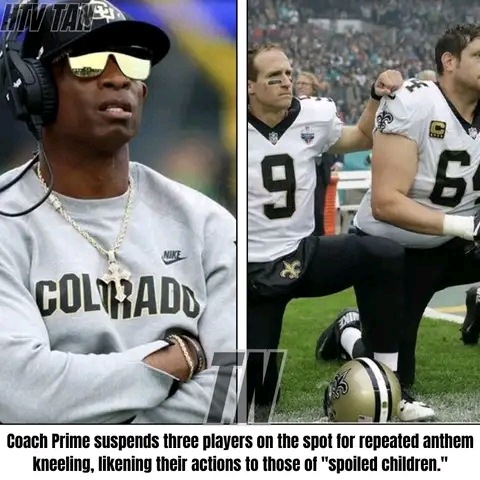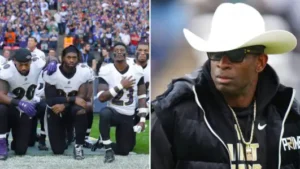CELEBRITY
Coach Prime suspends three players on the spot for repeated anthem kneeling, likening their actions to those of “spoiled children.”

Coach Prime Benched
In the high-stakes world of football, where tackles, touchdowns, and time-outs usually draw the most attention, a different type of stand-off took the spotlight: a battle between sportsmanship and activism. The distinguished Coach Prime, a vocal advocate for structured discipline and respect within his team, instigated a storm of debate and discussion when he decided to bench three of his consistent anthem-kneelers with a clear message: “Stand For The Flag.”

Known for his uncompromising dedication to both the sport and his athletes, Coach Prime has always walked a fine line between being a mentor and a strict disciplinarian. His decision to bench the three players who took a knee during the anthem wasn’t met without controversy. Supporters argue that such a firm stand protects the sanctity and unity of the sport, while critics view it as a suppression of the athletes’ voices and their right to peaceful protest.
To comprehend the motives behind Coach Prime’s decision, it’s crucial to explore his philosophy towards teamwork and patriotism. He has consistently emphasized the importance of unity, discipline, and collective respect, seeing the act of standing during the anthem as a symbol of solidarity not just with the team, but the nation. But does this infringe upon an individual’s right to express their dissent and fight for justice in a way that aligns with their conscience?
For the three players relegated to the bench, the coach’s directive places them in an unenviable position. On one hand, there is the aspiration to stand (or kneel) for what they believe is right and just, using their platform as professional athletes to draw attention to societal issues. On the other, there’s a distinct possibility of creating a rift, not only jeopardizing their careers but also potentially affecting team morale and unity.
The act of kneeling during the National Anthem, initiated by Colin Kaepernick in 2016, has been a silent yet resounding expression against racial injustice and police brutality. The act is embedded with a plea for recognizing and reforming systemic issues within society. When athletes kneel, it is not merely a physical act but a declaration of awareness and a call for change.
How has Coach Prime’s decision reverberated within the walls of the locker rooms? Teams are inherently built on trust and collective endeavor. When members are benched not for their athletic performance but for their personal beliefs and actions, it raises a pertinent question: where should the line be drawn between collective identity and individual expression?






